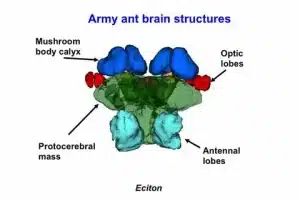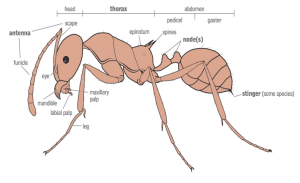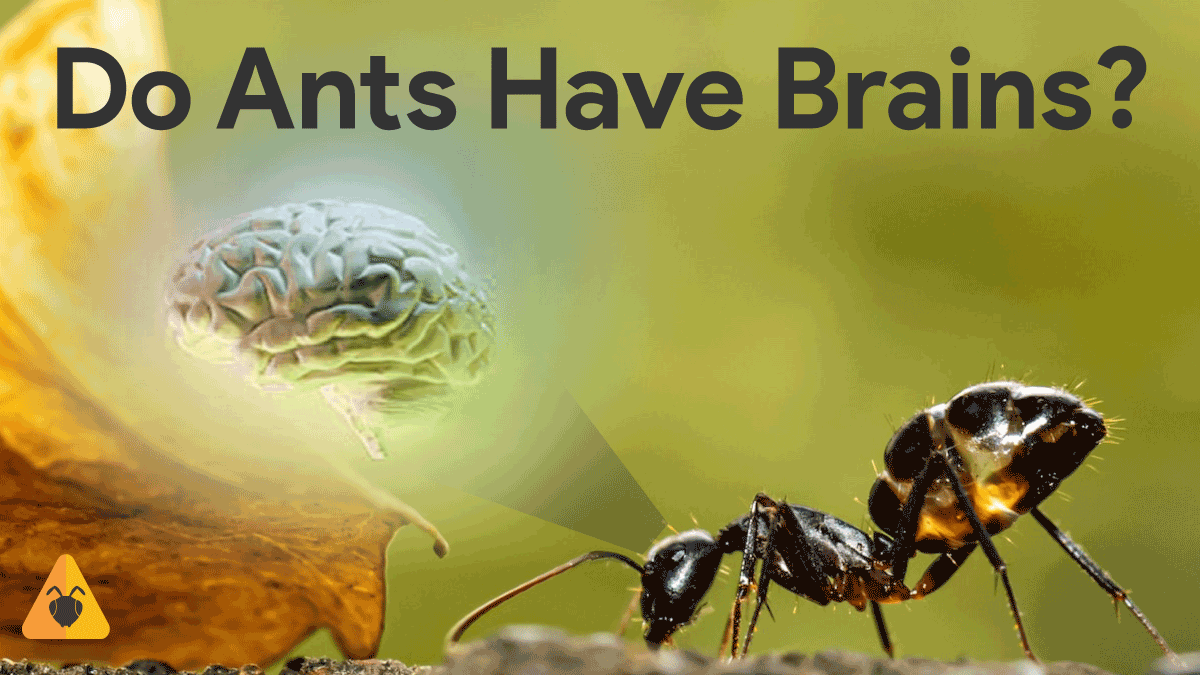Do ants have brains? A lot about how ants can use their tiny brains for such complex things!
Then I learned a lot of facts and mind-blowing information about the ant brain; you must be aware of it!
Though small and simple compared to human brains, brains allow them to exhibit intelligent behaviors that benefit the colony.
Insects possess additional organs that function as tiny brains. Insects have nerve clusters and a series of ganglia that do similar functions as brains.
Ant colonies as a whole display an intelligence greater than that of any single insect ant, demonstrating how evolution has shaped ant brains and nervous systems to maximize the survival and success of the group.
Remember that a complex network of tiny neurons enables those remarkable feats the next time you see an ant foraging or building structures.
Table of Contents
So, let’s dive in!
Do Ants Have Brains?
Ants are small creatures that live in highly organized colonies and also ants have feelings!
The total number of nerve cells in an ant brain can differ depending on the species.
However, most estimates suggest that there are about 250,000 nerve cells in an ant brain. When we compare them, we can see that human brains have a whopping 100 billion nerve cells.
That’s a really big number, 100,000,000,000!
But do ants have brains that allow them to exhibit complex behaviors?
The answer is yes! Ants do have brains, though they are quite different from our own.
Do Ants Smart?
While ants may seem simple compared to humans, they are capable of remarkable behaviors that require intelligence. Individual Ants can:
Communicate with each other through pheromones, sound, and touch.
Finding food in the wild and bringing it back to the nest, remembering the location of valuable resources.
Work together to solve problems and perform complex tasks as a colony of ants.
Recognize nestmates from intruders and defend the colony against threats.
Perform specialized jobs based on their role in the colony.
These sophisticated behaviors require some degree of intelligence, which stems from the ants’ brains and nervous systems.
Anatomy Of Ant Brain, What Does It Look Like?

Ants have a brain that is very small and simple compared to vertebrate brains.
An ant’s brain is two fused ganglia located in the head. Each ganglion is like a lobe and contains many neurons.
The ant’s sensory organs – eyes, antennae, and palps – are connected to the ganglia to receive and process sensory input.
The ganglia also connect to nerves that control the ant’s mandibles, legs, and other body parts.
What Is The Size Of The Ant Brain Or Ganglia?
The size of an ant’s brain, or ganglia, depends on the species and caste.
Generally speaking, brains are minuscule, measuring only around 1 mm in length.
However, the larger queen ants have ganglia up to 2-3 times larger than the worker ants.
Structure And Functions Of Ant Brain

Though small, the ant ganglia contain many specialized regions that allow for complex behaviors:
Optic lobes: Process visual information from the eyes and compound eyes.
Subesophageal ganglion: Processes sensory input from antennae and palps for touch, smell, and taste.
Frontal ganglion: Controls movement of mouthparts, walking, and grooming behaviors.
Bulb: Involved in releasing pheromones and communicating with other ants.
Peduncular lobes: Help with spatial learning, memory formation, and path integration.
The neural connections between these regions allow for the integrated performances we see from ant colonies, though the ants act more like “automatons” following biological programming.
Is The Queen Ant Smarter Than The Worker Ants?
Many studies suggest that queen ants have larger brains and more neurons than worker ants, making them smarter in some respects. Queens:
Live much longer and require more complex decision-making to lead the colony.
Have greater spatial memory to lay eggs in different locations of the nest.
Produce many pheromones to control the behavior of worker ants.
However, worker ants also exhibit intelligent behaviors that the queen cannot, like foraging, colony defense, and complex building of nest structures.
So while queens and workers have different cognitive capabilities, neither can be considered “smarter” in an absolute sense.
Mind-Blowing Facts About Ant Brain
Do ants have brains? Though small, an ant’s brain contains over 250,000 neurons. By comparison, the human brain has around 86 billion neurons.
Ant colonies act like a “superorganism” where the group intelligence exceeds that of any single ant. The colony can perform tasks that no ant could achieve alone.
Ants have a surprisingly good spatial memory, can remember the space of food sources, and navigate complex routes back to the nest.
Worker ants perform different tasks based on their age. Older “undertaker” ants dispose of the dead, while younger ants perform more physically demanding jobs.
DO ANTS HAVE BRAINS VIDEO
Conclusion
While ant brains are primitive compared to ours, they still allow for sophisticated behaviors demonstrating cognitive ability and group intelligence.
The specialized structure of ant brains has evolved to help ant colonies survive and thrive in their complex environments.
While minuscule in size and simple structure compared to human brains, brains allow for surprisingly complex and intelligent group behaviors that benefit the colony.
The complex division of labor, communication through pheromones, collaborative problem solving, and remarkable navigation abilities of ants would not be possible without the information processing power of their ganglia.
While ant brains are pale compared to the human brain, they are wonderfully designed to fulfill the unique purposes of ant colonies.
I hope you loved reading this!
FAQ.s
How many species of ants are there?
There are over 12,000 known ant species, and scientists believe there could be many more waiting to be discovered.
Can ants lift objects heavier than themselves?
Yes, ants are incredibly strong and can lift objects many times their body weight.
Do ants sleep?
Ants have periods of inactivity that resemble sleep, but they differ significantly from the sleep patterns of mammals.
How do ants survive underwater?
Certain ant species have adaptations that allow them to survive short periods underwater, such as forming air bubbles around their bodies.
Can ants recognize individual humans?
Ants primarily rely on chemical cues to identify individuals in their colony, but they might perceive humans as potential threats or food sources.
How long do ants live?
The lifespan of an ant varies depending on the species, with worker ants typically living for a few months, while queens can live for several years.
Related Articles
Do Ants Have Eyes | Top Facts With Explanation
Termites Vs Ants: Top Major Differences Between Both Of Them
Do Ants Poop Or Frass | Top Facts And Science Behind It!
Sugar Ant Bites | Tips N Tricks To Treat Them (Proper Guide)
